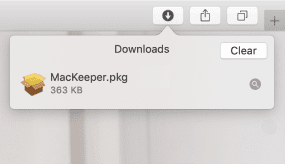In this article you will find the following:
There are millions of apps out there. As an App Store user, it can be difficult to determine which apps are safe and which ones possibly aren't. You take care of your Mac to ensure it doesn’t get physically damaged or stolen. Likewise, you want to ensure you’re not compromising it with harmful software. After all, your Apple device houses all your sensitive information, sentimental photos, and other important data.
But you might not know how to determine if the apps you want to try on the App Store are secure. And if not, you’d want to know what makes them unsafe and how you can safeguard yourself.
Before we start
Chances are, some of the apps you haven’t used in a while haven’t been updated. This means they could contain bugs and security loopholes that can be exploited by malicious actors. Consider how many unused apps are collecting dust on your Macbook and why you haven’t deleted them.
If you care about protecting your privacy, use software to remove unwanted apps on your Apple computer. MacKeeper’s Smart Uninstaller tool safely removes apps you don’t use and their leftover files, which also optimizes your Mac. Here’s how to use it:
- Download MacKeeper
- Click Smart Uninstaller in the left pane
- The Smart Uninstaller tool will find and show you the unused apps and junk files it intends to delete. Click the Remove Selected button
- Sit back, relax, and MacKeeper will be done in no time.
There are several ways to ensure you download safe apps, like performing a search on the apps prior to installing them and reading the privacy policy thoroughly. In this article, we’ll explore all this in greater detail and discuss whether all apps on the Apps Store are truly safe.
Is the App Store secure?
The short answer: yes, at least for the most part. When buying or downloading and installing an app from the App Store, you can rest assured that it’s secure and safe for your Mac and, ultimately, good for your privacy.
Do App Store apps have viruses?
They typically don’t, so it’s unlikely that your Apple laptop could get a virus from the App Store. The App Store is thought to be safer than Google Play, which is generally considered to host apps that contain bugs and cause security concerns. According to Apple’s Developer website, more than 90% of iOS apps are reviewed in less than 24 hours. Hence, only trusted, high-quality apps are accepted to be listed on the App Store.
Having said that, even though App Store viruses are few and far between, you should never blindly trust that all apps are safe or let your guard down. While Apple reviews all apps prior to adding them to the App Store, they can become unsafe to use after some time. This is especially true for apps that aren’t updated regularly or haven’t been updated in a long time. Hackers can take advantage of the security loopholes in those apps to infect your Macbook with viruses and malware.
This also applies if you download apps on Mac without App Store.
How Apple keeps the App Store safe
Apple puts apps through stringent processes to help keep the App Store, and therefore users, safe, using the methods listed below:
Manual review
Apple has humans test apps during the review process. So, when you play your favorite game on an iOS app, rest assured that someone at Apple has played it to determine how safe it’s for users like you. It’s a time-consuming process, but it shows Apple’s commitment to listing only the best apps on the App Store.
Of course, there’s always room for human error, and hackers can find new techniques to bypass the system. However, Apple usually catches these loopholes within no time and patches up any gaps in the app’s security because security in the App Store is highly prioritized.
Digital signing
Different apps have varying functionalities. Some can send you notifications, while others don’t do much. This is determined by whether app developers have obtained Apple developer certificates.
Developer certificates grant apps access to certain iOS features, like the ability to bring up Apple Pay. Developers don’t get these certificates by default—they have to request them from Apple and insert them into their code. This process is known as digital signing.
Digital signing determines what apps can and can’t do on your device, which allows Apple to flag them should they do something other than what they obtained the certificates for. This, in turn, protects users from being targeted or taken advantage of by app developers.
Non-discriminatory ruling
In reviewing apps and granting them access to iOS features, Apple shows no bias against developers. Apple treats all developers fairly, regardless of their prominence, the popularity of their apps on the App Store, and how much money they make.
In other words, larger, more established businesses can’t pave their way into the App Store. This also protects you and your privacy because it ensures that all apps go through the same processes, no matter what.
Some app developers and businesses have expressed their frustrations over Apple’s strict rules in the past. Others have praised it for being a no-nonsense company whose favor can’t be bought.
Apps you won’t find on the App Store
Naturally, not all apps make it past Apple’s review processes. Apple revealed in a 2021 blog post that it had rejected or removed nearly a million new apps and another approximately one million app updates in 2020. Below are the reasons why Apple may block apps from being listed on the App Store:
- Objectionable or offensive content
- Free-reign user content
- Apps that lead to physical harm
- Apps that circumvent your privacy.
Objectionable or offensive content
Consider the last time you used or came across an app that contained offensive content in the App Store. You probably haven’t because Apple doesn’t list apps of that nature. Apple bans any apps that are considered inappropriate for public use. Apps that fall into one or more of these categories are banned on the App Store include:
- Pornographic
- Graphic violence
- Discriminatory content, especially content that discriminates against gender, race, religion, and sexuality (apps that contain satire and comedy may get a pass)
- Apps showing how to conduct illegal behavior or encourage it.
Free-reign user content
Apps that allow user-generated content can be shut down on the App Store if they allow users to do as they please without moderation. This places responsibility on the developer to moderate its users’ content to ensure they aren’t posting anything objectionable or offensive.
You might be thinking, “don’t social media apps allow users to express their opinions freely due to freedom of speech?” Yes, they do, but social media apps must ensure that users don’t cross the line.
Granted, that can be difficult to do. And, as you may have seen, social media users can post extreme views and controversial content. Developers must have clear community guidelines. They must assess users’ content and behavior and manage it based on their community guidelines to avoid being blocked on the App Store.
Apps that lead to physical harm
In addition to offensive content, Apple gets rid of apps that may cause physical injury or harm. To that end, Apple flags apps that encourage the use of tobacco or illegal substances. Any apps that offer medical advice and determine drug dosages are also flagged, unless those apps are published by accredited institutions and developers.
Apps that circumvent your privacy
Apple’s app review processes and security measures are largely geared toward protecting your privacy. It’s mandatory for apps handling personal information to meet Apple’s security requirements, so any app that doesn’t will be rejected. This reduces the possibility of the apps on the App Store getting hacked.
How malware is uploaded to the App Store
Although uncommon, App Store malware and App Store virus cases have occurred in the past. But how are hackers able to pull this off, given how strict Apple is about app security?
Malicious apps prompt your Mac to visit websites that run invisible ads in the background, so they can secretly make money from ads. After all, ads are the bread and butter of apps and websites—it’s how they make money apart from app payments.
Developers know how thorough Apple’s app review process is, so they program their apps to pass it. That’s why some apps only start behaving maliciously after they’ve been installed on a user’s computer to avoid being caught by Apple.
What do malicious apps do?
Apple is strict about the apps it approves to be listed on the App Store, and for good reason. Below are the malicious activities apps can participate in:
Ad Fraud
Advertising in itself isn’t frowned upon in the App Store. In fact, it’s common for legitimate apps to show ads, so they can make money. However, some apps are involved in ad fraud, running invisible ads in the background, and thereby, using your Apple laptop to potentially make even more money.
It’s fraudulent because it’s done secretively without your knowledge. Additionally, this practice can deplete your laptop’s battery and use a lot of bandwidth.
Information Theft
Apps are limited in the amount of info they can steal from your computer because they’re installed in a sandbox. But that doesn’t mean they can’t steal your information at all.
Malicious apps can use spyware to access everything you copy onto your clipboard, which poses a great risk to your privacy. For example, if you copy and paste your banking details while using online banking, that information can be stolen. Your bank accounts can be accessed, and your funds can be used or cashed out. Other personal information you input or store in your apps can also be stolen.
Browser Hijacking
Malicious apps can take over your browser and open malicious links. These malicious links typically launch phishing attacks to get you to give up your personal information. If not that, they attempt to gain entry to your device through a security vulnerability.
Phishing Alerts
Phishing is a common method used by hackers and cybercriminals. They send out phishing alerts from apps, which masquerade as legitimate alerts from reputable sources, to obtain your user details. For example, a malicious app can send you an alert claiming to be from your local bank, asking for your banking credentials. The important thing to remember is to never engage with such alerts.
What to consider before downloading an app
Never blindly download and install apps. Always do your due diligence first before downloading an app from the App Store. Follow these tips to download a safe app on the App Store:
- Explore the app and its developers
- Check the version history
- Read the App's privacy policy
- Read the App's permissions
- Check the App reviews and comments.
Explore the app and its developers
Google has a plethora of reliable sources you can check to determine if an app or its developers are legit. Be skeptical about any apps and developers that don’t have any public information available online.
Check the version history
Every app that hasn’t been updated in the last few weeks or months is a problem because it means it’s not being maintained. Without regular updates, the app isn’t safe and secure, as hackers can easily take advantage of any bugs or security flaws that may be present in older versions. Go for apps that have multiple recent updates.
Read the app's privacy policy and app permissions
Take a moment to read an app’s privacy policy and app permissions thoroughly. This will ensure you don’t grant an app permission to obtain and use your personal information beyond what’s necessary.
Let the nature of the app guide you. For example, not all apps need to use your camera, so those that don’t need to shouldn’t ask for permission. Similarly, apps don’t need access to your passcode, so you should never grant them permission to use it.
Check the app reviews and comments
Although some app reviews and comments are disingenuous (some apps pay for positive reviews), others are honest and reliable. Pay careful attention to bad reviews to determine if they’re a deal-breaker. For example, bad reviews about an app’s privacy shouldn’t be ignored.
How to avoid malicious apps?
You can’t always tell when an app is malicious. However, there are ways to avoid engaging with a malicious app on your Mac. Here’s how:
- Use a reliable antivirus
- Don't jailbreak a device
- Keep iOS updated
- Research less popular apps
- Understand how malicious apps behave.
Use a reliable antivirus
There’s no two ways about it. Antivirus programs mask your real IP address, so you can use the internet safely without detection. More importantly, they prevent hackers, cybercriminals, and bad actors from infecting your computer with viruses. MacKepeer’s Antivirus tool is a reliable antivirus program that removes viruses and malware and blocks them with new app installations.
Don't jailbreak a device
Jail breaking is the worst thing you can do and poses one of the biggest threats to your privacy. That’s because it bypasses your Apple device’s security system, which prevents it from doing its job— keeping threats out.
Keep iOS updated
Apple updates its software to fix any bugs and patch security flaws that can be used to gain entry into your Mac or infect it with viruses and malware. Keeping your iOS updated is an effective way to keep viruses and malware out of your computer.
Research less popular apps
Do your homework on apps that aren’t popular or from unknown developers instead of outright discounting them. Read up about the developers on reliable sites and sources. You can read reviews, too, although they can be paid for, so take them with a pinch of salt. Be weary of apps that lack reviews or information online.
Understand how malicious apps behave
Malware is designed to fly under the radar, so it can be hard to weed out. Hackers and malicious developers know their way around apps, so they know how to hide viruses and malware. A telltale sign that an app is malicious is if it depletes your device’s resources, like the battery and bandwidth. Malicious apps can also cause your Macbook to overheat.
Are App Store apps safe?
Apps in the App Store are as safe as can be. Generally speaking, you shouldn’t come across any malicious or unsafe apps in the App Store—Apple does a pretty good job of vetting them. However, that doesn’t mean you shouldn’t do your due diligence.
Take the time to learn about any apps you’re interested in and their developers—what information is out there about them? What do users have to say in the reviews? Have they been in the media for privacy or security concerns?
Along with your research, ensure you use MacKeeper’s Smart Uninstaller to remove any old, unused apps on your Mac. This tool will reduce the risk of having your Apple device infected with viruses and malware as well give you a peace of mind knowing that your privacy is protected.







